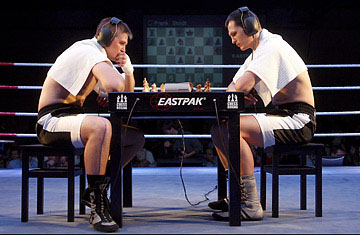
(Left to Right) Russian Nikolay "The Chairman" Sazhin in action with German Frank Stoldt during their light heavyweight world championship title in chess boxing in Berlin Germany.
"It sounds like a gimmick," admits Hip-Hop Chess Federation founder Adisa Banjoko. But chess and physical combat are being merged not only in the U.S. — where Banjoko's group advocates combining chess and martial arts as a way to teach kids the importance of strategy and non-violence — but in Europe, where a bloodier version is flourishing. The slogan for the Berlin-based World Chess Boxing Organization: "Fighting is done in the ring and wars are waged on the board."
The chess-boxing combo traces its roots back to a 1992 comic book, titled The Nikopol Trilogy, in which the men of the future box on a chessboard floor. The image inspired Dutch artist Iepe Rubingh to hold — and compete in — the first official chess-boxing bout in Amsterdam in 2003.
Since then, chess-boxing has attracted more than 150 professional competitors, the attention of ESPN Sports Center, even praise from Lennox Lewis. The World Chess Boxing Organization, which now has official training clubs in Berlin, London and Sofia, Bulgaria, calls itself an intellectual fight club. Spokesman Andreas Dilschneider, who is also one of the chess trainers for Berlin's chess-boxing club, says the dual sport is primed to become "the biathlon of the 21st century."
The matches work like this: competitors alternate between three-minute rounds of boxing and four-minute rounds of speed chess with one-minute breaks in between to get the gloves off and hunker down at the chess table. The winner is determined by knockout, checkmate, or referee decision.
The 2008 World Champion Chessboxer, Russian math student Nikolaj Sazhin, 19, won the light heavyweight division in Berlin on July 5 in front of a thousand fans, after seizing his punch-drunk opponent's queen in the fifth round of chess.
"For me the sport is very attractive and demanding and also in a kind of way spectacular," Sazhin said, via a translator. "You have to be totally cooled down in chess coming out of the boxing round. The adrenaline is the problem."
European chess-boxing arose independently from the American hip-hop community's efforts to train children in chess alongside martial arts like Jujitsu. One of hip-hop's biggest chess fans is the Wu-Tang Clan's RZA. (He plays exhibition chess matches on WuChess.com: "Play in tournaments for prizes, or just for the joy of flexin' ya mentals.") Banjoko and RZA will be speaking to the U.N. in August about the practice's potential for giving children resources for peaceful conflict resolution.
"If you don't know anything about chess-boxing it might seem a strange combination", says Dilschneider, "but if you think about it, in both sports there are many parallels." Just as you can be knocked out in boxing, "you can be in front in chess for 10 or 20 moves. You can build up a very strong position. You can be a very good player. But if for one moment you are not aware, and you make one bad move, the whole game is over."
